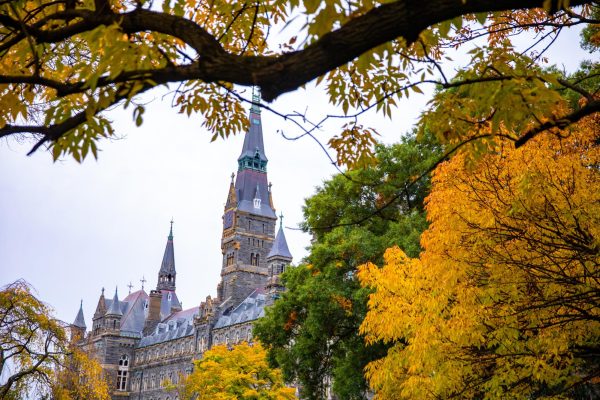The Georgetown University department of Arabic and Islamic studies will inaugurate an Islamic studies minor beginning in the Fall 2025 semester, members of the department confirmed to The Hoya Feb. 13.
The minor will center on the history, literature and culture of Islamic civilizations through six courses that do not require an Arabic language background, distinct from the department’s current language-based Arabic major and minor. The department began the formal process for creating the minor in spring 2024, and the university approved the program Nov. 12, 2024.

Felicitas Opwis, director of graduate studies in the Arabic and Islamic studies department, said the department saw that students were interested in studying Islam without learning Arabic but did not have a place to do so.
“We thought, ‘Let’s provide a program that, in this regard, caters to the needs of those students who would like to know more about Islam and its intellectual history and everything else but who do not necessarily want the language component,’” Opwis told The Hoya. “And out of that consideration, we then thought about developing a minor.”
Opwis said the minor aims to show students that Islamic studies encompasses more than studying Arabic.
“I hope that they get a better understanding of all of the varieties of Islam, and that while, yes, Arabic is a very important component of Islam and the Islamic historical developments and civilizations that stand behind it, it’s not all of it,” Opwis said.
Rodrigo Adem, an Islamic studies professor, said the minor builds on Georgetown’s liberal arts curriculum by centering Islam in the study of history and culture.
“There is this actual Islamic civilizational component to the humanities, so we want to include all those Islamic heritages,” Adem told The Hoya. “The minor has literature, poetry and religion. Some of that might be theology or philosophy or mysticism — it could be considered part of a well-rounded education.”
“We should all be expanding the corpus of materials that we’re using to study the humanities. Chinese, Indian, Roman, Greek — these are foundational cultures,” Adem added. “They represent for us the historical development of human thought.”
Sara Omar, director of undergraduate studies in the Arabic and Islamic studies department, said students interested in politics, international affairs or journalism would especially benefit from the minor because it provides context for U.S. relations with the Middle East and North Africa (MENA).
“It’s a natural fit because you need to have an understanding of the culture and the history and the context of the region before you pursue any government study, before you pursue anything related to the region, really,” Omar told The Hoya.
“It gives you a backdrop to the modern conversations that are taking place,” Omar added.
Omar said the minor will supplement students’ other academic interests, making it an appealing program across all undergraduate schools.
“You might be interested in security studies, but what can you gain by studying the history of the region that may inform your understanding of security studies today?” Omar said. “So it is interdisciplinary in the sense that it’s definitely offering students a more well-rounded education: context, history, culture, language.”
Adem said the program will also support Muslim students to look at their religion through an academic lens, potentially adding another dimension to their faith.
“It allows people to talk about their religion and contemporary discourse,” Adem said. “It’s not just something in the past, it’s not just something that one personally believes, but you can talk about it in time and space and have a history. Sometimes people find new texts, they find out new things about the past.”
Adem added that he hopes the minor will display the depth of Islamic studies beyond religious texts and theology.
“Some people, when they think of Islamic studies, they might only think of scripture — the Quran or Islamic law — but I think now we can talk about a variety of courses that encompass literature and history and philosophy,” Adem said. “There’s a growing understanding in our department that the full buffet of options should be available.”
Omar said she believes students will appreciate the minor’s offerings, and she hopes the department can launch an Islamic studies major in the future.
“It’s going to take some time to take off, but I think there’s a need for it,” Omar said. “And we have plenty of faculty who offer courses in Islamic Studies. I think it’ll be a successful minor.”








